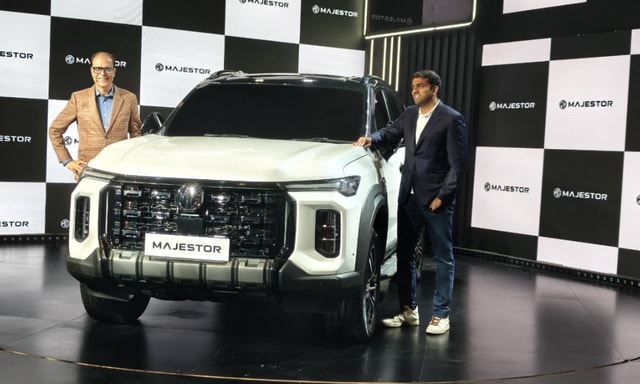U.S. House Democrats Seek At Least $160 Billion In New EV Funding

A group of 29 U.S. House Democrats want congressional leaders to include at least $160 billion in additional funding for electric vehicles as part of a $3.5 trillion spending measure, according to a letter seen by Reuters.
A bipartisan $1 trillion infrastructure bill includes $7.5 billion for electric vehicle charging stations and some other EV-related funding estimated at $2.5 billion to $5.5 billion.
President Joe Biden in March called for $174 billion in total spending on electric vehicles, including $100 billion in consumer incentives and $15 billion to build 500,000 EV charging stations.
The previously unreported letter dated Wednesday said Congress should ensure at least $174 billion in total EV funding "including light-duty consumer incentives, EV charging infrastructure funding, EV manufacturing incentives, federal EV procurement requirements, and incentives to electrify heavy-duty commercial fleets."
They also want to ensure that "no less than 40% of the investments go to disadvantaged communities."
Representative Doris Matsui, who helped lead the letter, cited a U.N. climate panel report this week that found global warming is dangerously close to spiraling out of control.
"Robust EV investments are critical to meet the challenges of the climate crisis, and we must be willing to take bold steps to build a better future," she said.
On Tuesday, a separate group of Democratic lawmakers said they wanted $85 billion for electric vehicle charging efforts.
The push faces opposition from Republicans. On Tuesday, the Senate voted 51-48 in support of a non-binding amendment to prohibit taxpayers from claiming EV tax credits if they make more than $100,000 a year or if the vehicles cost more than $40,000.
Republican Senator Deb Fischer, the amendment's author, questioned "why we're subsidizing this industry at all" and said lawmakers should deny "taxpayer subsidies for the rich."
A Senate panel in May voted to expand the credit to up to$12,500, limiting credits to vehicles below $80,000.
Michigan Democrat Senator Debbie Stabenow opposed Fischer's amendment calling it "anti-pickup truck." She said the price ceiling would mean EV pickups would not be eligible for credits.
The current maximum tax credit is $7,500 with no maximum vehicle price and phases out for individual automakers once they hit 200,000 total EVs sold.
General Motors Co, Ford Motor Co and Chrysler-parent Stellantis NV, in a joint statement last week said they aspired "to achieve sales of 40%-50% of annual U.S. volumes of electric vehicles... by 2030." Automakers said hitting that ambitious goal would require hefty government EV spending.
Latest News
 car&bike Team | Jan 19, 2026Skoda Kushaq Facelift Debut Tomorrow: What To ExpectFacelifted Kushaq to get updated looks and new tech inside the cabin.1 min read
car&bike Team | Jan 19, 2026Skoda Kushaq Facelift Debut Tomorrow: What To ExpectFacelifted Kushaq to get updated looks and new tech inside the cabin.1 min read Jaiveer Mehra | Jan 17, 20262026 Tata Punch Facelift Price, Variants ExplainedUpdated Punch is available in 8 trim levels with naturally aspirated petrol, CNG and turbo-petrol engine options.3 mins read
Jaiveer Mehra | Jan 17, 20262026 Tata Punch Facelift Price, Variants ExplainedUpdated Punch is available in 8 trim levels with naturally aspirated petrol, CNG and turbo-petrol engine options.3 mins read car&bike Team | Jan 17, 2026Skoda Kushaq Facelift Teased Ahead of Launch In Coming WeeksMid-lifecycle update to bring with it styling updates as well as new features inside the cabin.1 min read
car&bike Team | Jan 17, 2026Skoda Kushaq Facelift Teased Ahead of Launch In Coming WeeksMid-lifecycle update to bring with it styling updates as well as new features inside the cabin.1 min read car&bike Team | Jan 16, 2026Pierer Mobility AG Rebranded as Bajaj Mobility AG Following KTM TakeoverThis marks a major shift in ownership and strategic direction in the global motorcycle industry.1 min read
car&bike Team | Jan 16, 2026Pierer Mobility AG Rebranded as Bajaj Mobility AG Following KTM TakeoverThis marks a major shift in ownership and strategic direction in the global motorcycle industry.1 min read Seshan Vijayraghvan | Jan 16, 2026Kia Syros Variant Line-Up Expanded With HTK (EX) Trim; Prices Start At Rs. 9.89 LakhPositioned between the HTK (O) and HTK+ trims, the new variant will be offered in both petrol and diesel options.2 mins read
Seshan Vijayraghvan | Jan 16, 2026Kia Syros Variant Line-Up Expanded With HTK (EX) Trim; Prices Start At Rs. 9.89 LakhPositioned between the HTK (O) and HTK+ trims, the new variant will be offered in both petrol and diesel options.2 mins read car&bike Team | Jan 16, 2026MG Majestor India Launch On February 12Unveiled in India at the 2025 Bharat Mobility Expo, the Majestor is expected to be positioned as a more premium alternative to the Gloster.1 min read
car&bike Team | Jan 16, 2026MG Majestor India Launch On February 12Unveiled in India at the 2025 Bharat Mobility Expo, the Majestor is expected to be positioned as a more premium alternative to the Gloster.1 min read
 Amaan Ahmed | Jan 17, 2026Bajaj Chetak C25 First Ride Review: Basic, Likeable E-Scooter For First-Time RidersThe Chetak C25, in quite a few ways, is poles apart from the larger and more powerful 30 and 35 Series models, but in its mannerisms, it is very much a Chetak.8 mins read
Amaan Ahmed | Jan 17, 2026Bajaj Chetak C25 First Ride Review: Basic, Likeable E-Scooter For First-Time RidersThe Chetak C25, in quite a few ways, is poles apart from the larger and more powerful 30 and 35 Series models, but in its mannerisms, it is very much a Chetak.8 mins read Bilal Firfiray | Jan 9, 2026Toyota Urban Cruiser Hyryder: 10,000 km Long-Term ReviewAfter spending over three months and 10,000 km with the Toyota Urban Cruiser Hyryder Hybrid, we were impressed by its real-world mileage, seamless hybrid, practical comfort, and Toyota reliability. Is it the best C-SUV then?5 mins read
Bilal Firfiray | Jan 9, 2026Toyota Urban Cruiser Hyryder: 10,000 km Long-Term ReviewAfter spending over three months and 10,000 km with the Toyota Urban Cruiser Hyryder Hybrid, we were impressed by its real-world mileage, seamless hybrid, practical comfort, and Toyota reliability. Is it the best C-SUV then?5 mins read Seshan Vijayraghvan | Jan 8, 20262026 Mahindra XUV 7XO Review: Big On Tech, Bigger On ComfortThe new Mahindra XUV 7XO is flashier, feature packed, and comes with more advanced tech. But are the changes just incremental or actually substantial?1 min read
Seshan Vijayraghvan | Jan 8, 20262026 Mahindra XUV 7XO Review: Big On Tech, Bigger On ComfortThe new Mahindra XUV 7XO is flashier, feature packed, and comes with more advanced tech. But are the changes just incremental or actually substantial?1 min read Preetam Bora | Jan 10, 2026Simple One Gen 2 First Ride Review: 265 km Claimed Range!The Gen 2 model of Simple Energy’s first electric scooter gets a fair few updates, including new features, tech, more range and lighter weight. We spent a couple of hours with the Simple One Gen 2 to find out if it manages to impress.6 mins read
Preetam Bora | Jan 10, 2026Simple One Gen 2 First Ride Review: 265 km Claimed Range!The Gen 2 model of Simple Energy’s first electric scooter gets a fair few updates, including new features, tech, more range and lighter weight. We spent a couple of hours with the Simple One Gen 2 to find out if it manages to impress.6 mins read Amaan Ahmed | Jan 3, 2026VLF Mobster 135 300 KM Review: Fun But FlawedA 125 cc scooter with Italian design and Chinese genes is a rare combination, and while some may be tempted to dismiss it because of its origins, the VLF Mobster shows 125s can also be exciting – but not without compromises.11 mins read
Amaan Ahmed | Jan 3, 2026VLF Mobster 135 300 KM Review: Fun But FlawedA 125 cc scooter with Italian design and Chinese genes is a rare combination, and while some may be tempted to dismiss it because of its origins, the VLF Mobster shows 125s can also be exciting – but not without compromises.11 mins read






















































































































